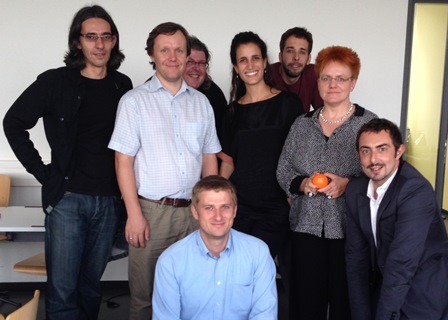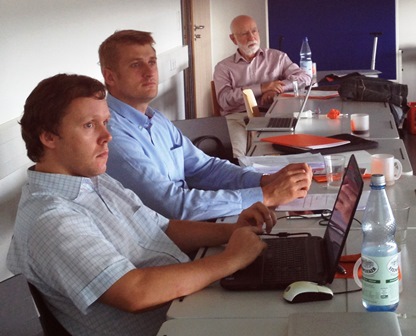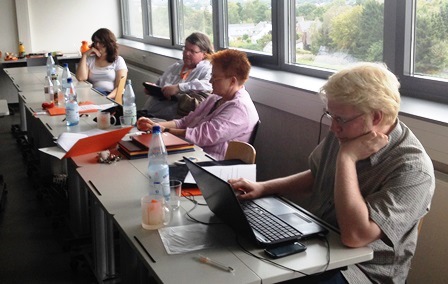 On 28-29 August 2014, the Dortmund University of Applied Sciences and Arts (UASA) hosted the third workshop to be organised in the framework of the project "Re-socialisation of offenders in the EU: enhancing the role of the civil society" (RESOC). Participants included Prof Dr Christine Graebsch, Professor, Dortmund University of Applied Sciences and Arts (Germany), Dr Sven-Uwe Burkhardt, Associate Professor, Dortmund University of Applied Sciences and Arts (Germany), Mr Dimitar Markov, Senior Analyst, Law Program, Center for the Study of Democracy (Bulgaria), Dr Gytis Andrulionis, Deputy Director, Law Institute (Lithuania), Mr Simonas Nikartas, Head of Criminological Research Department, Law Institute (Lithuania), Mr Nicola Giovannini, President, Droit au Droit (Belgium), Mr Alejandro Forero Cuellar, Researcher, Ms Maria Celeste Tortosa, Researcher, Observatory on the Penal System and Human Rights with the University of Barcelona (Spain). The workshop also benefitted from the participation of the guest speaker Prof. Dr. Johannes Feest, renowned penologist and sociologist of law.
On 28-29 August 2014, the Dortmund University of Applied Sciences and Arts (UASA) hosted the third workshop to be organised in the framework of the project "Re-socialisation of offenders in the EU: enhancing the role of the civil society" (RESOC). Participants included Prof Dr Christine Graebsch, Professor, Dortmund University of Applied Sciences and Arts (Germany), Dr Sven-Uwe Burkhardt, Associate Professor, Dortmund University of Applied Sciences and Arts (Germany), Mr Dimitar Markov, Senior Analyst, Law Program, Center for the Study of Democracy (Bulgaria), Dr Gytis Andrulionis, Deputy Director, Law Institute (Lithuania), Mr Simonas Nikartas, Head of Criminological Research Department, Law Institute (Lithuania), Mr Nicola Giovannini, President, Droit au Droit (Belgium), Mr Alejandro Forero Cuellar, Researcher, Ms Maria Celeste Tortosa, Researcher, Observatory on the Penal System and Human Rights with the University of Barcelona (Spain). The workshop also benefitted from the participation of the guest speaker Prof. Dr. Johannes Feest, renowned penologist and sociologist of law.
The purpose of the workshop was to discuss the application and scope of alternatives to sentences of imprisonment (i.e. non-custodial or ambulant sanctions), the existing measures to address the needs of vulnerable groups of inmates, as well as the implementation of prison monitoring mechanisms in five EU target Member States (Belgium, Bulgaria, Germany, Lithuania and Spain).
 Questions at the centre of this workshop included: what exactly falls within the scope of "alternatives to imprisonment" and how to assess the effectiveness of such measures, in particular in respect of their resocialisation objective? Is the offenders' perspective taken into account in such evaluation? Do these measures actually represent alternatives to imprisonment or do they result in a net-widening effect? To what extent and how NGOs are involved in the ambulant sanction systems? How to define and identify vulnerable groups of inmates? What is the origin of these vulnerabilities and the role of the prison itself as source or aggravating factor? Which measures are implemented to address them (within or outside prisons) and which one can be identified as promising? What is the role of civil society in the provision of programmes or services aimed at responding to the needs of these vulnerable groups?
Questions at the centre of this workshop included: what exactly falls within the scope of "alternatives to imprisonment" and how to assess the effectiveness of such measures, in particular in respect of their resocialisation objective? Is the offenders' perspective taken into account in such evaluation? Do these measures actually represent alternatives to imprisonment or do they result in a net-widening effect? To what extent and how NGOs are involved in the ambulant sanction systems? How to define and identify vulnerable groups of inmates? What is the origin of these vulnerabilities and the role of the prison itself as source or aggravating factor? Which measures are implemented to address them (within or outside prisons) and which one can be identified as promising? What is the role of civil society in the provision of programmes or services aimed at responding to the needs of these vulnerable groups?
 The workshop was also dedicated to discussing the implementation in the aforementioned five EU countries of the Optional Protocol to the Convention against Torture and other Cruel, Inhuman or Degrading Treatment or Punishment (OPCAT) and the challenges faced by the relevant bodies in charge of prisons' inspection and monitoring (in line with the basic principle No. 9 of the European Prison Rules); as well as the elaboration of a Prison Monitoring Index aimed at assessing prison conditions in a comprehensive manner (material conditions, legal regulations, implementation of prisoners' rights) and allowing for comparative evaluation at national and international level.
The workshop was also dedicated to discussing the implementation in the aforementioned five EU countries of the Optional Protocol to the Convention against Torture and other Cruel, Inhuman or Degrading Treatment or Punishment (OPCAT) and the challenges faced by the relevant bodies in charge of prisons' inspection and monitoring (in line with the basic principle No. 9 of the European Prison Rules); as well as the elaboration of a Prison Monitoring Index aimed at assessing prison conditions in a comprehensive manner (material conditions, legal regulations, implementation of prisoners' rights) and allowing for comparative evaluation at national and international level.








